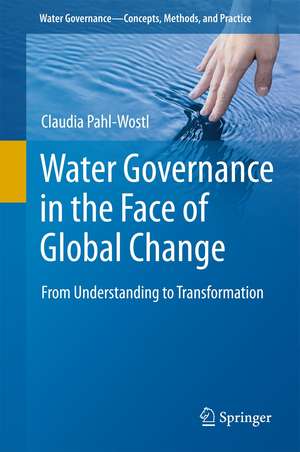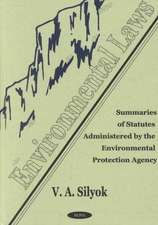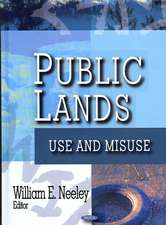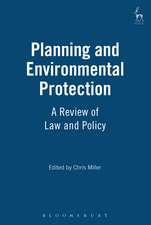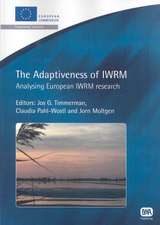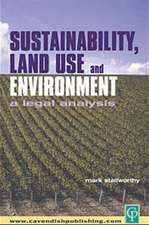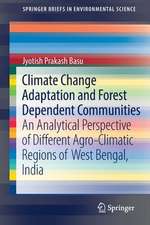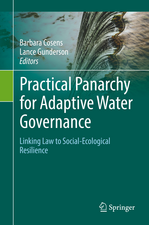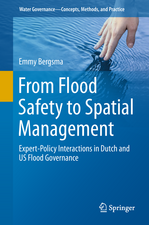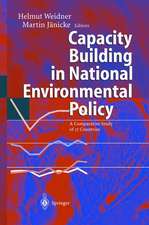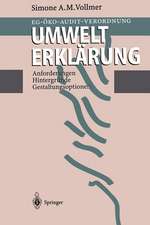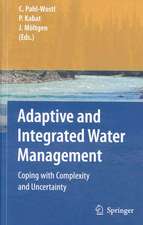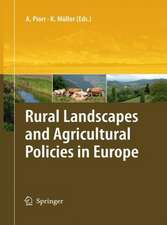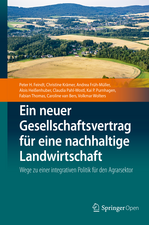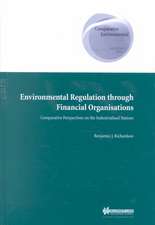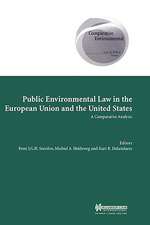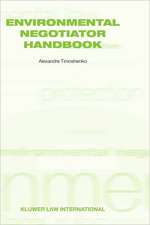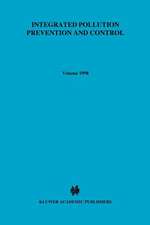Water Governance in the Face of Global Change: From Understanding to Transformation: Water Governance - Concepts, Methods, and Practice
Autor Claudia Pahl-Wostlen Limba Engleză Hardback – 14 sep 2015
| Toate formatele și edițiile | Preț | Express |
|---|---|---|
| Paperback (1) | 481.54 lei 38-44 zile | |
| Springer International Publishing – 22 oct 2016 | 481.54 lei 38-44 zile | |
| Hardback (1) | 644.30 lei 38-44 zile | |
| Springer International Publishing – 14 sep 2015 | 644.30 lei 38-44 zile |
Preț: 644.30 lei
Preț vechi: 847.76 lei
-24% Nou
Puncte Express: 966
Preț estimativ în valută:
123.30€ • 133.89$ • 103.57£
123.30€ • 133.89$ • 103.57£
Carte tipărită la comandă
Livrare economică 18-24 aprilie
Preluare comenzi: 021 569.72.76
Specificații
ISBN-13: 9783319218540
ISBN-10: 3319218549
Pagini: 250
Ilustrații: XV, 287 p. 48 illus.
Dimensiuni: 155 x 235 x 22 mm
Greutate: 0.6 kg
Ediția:1st ed. 2015
Editura: Springer International Publishing
Colecția Springer
Seria Water Governance - Concepts, Methods, and Practice
Locul publicării:Cham, Switzerland
ISBN-10: 3319218549
Pagini: 250
Ilustrații: XV, 287 p. 48 illus.
Dimensiuni: 155 x 235 x 22 mm
Greutate: 0.6 kg
Ediția:1st ed. 2015
Editura: Springer International Publishing
Colecția Springer
Seria Water Governance - Concepts, Methods, and Practice
Locul publicării:Cham, Switzerland
Public țintă
ResearchRecenzii
“The book covers a wide range of water governance related issues, including policies, institutions, actors, governance modes and scales – to name only a few. As such, it is well suited for anyone familiar with water governance and willing to go deeper into certain topics while keeping a synthetic vision of the field. … This book provides a broad and systemic approach in order to do justice to the complexity of water governance systems and their dynamics.” (Émeline Hassenforder, Natures Sciences Societes, Vol. 25 (1), 2017)
Notă biografică
Claudia Pahl-Wostl is a Professor of Resources Management and Director of the Institute for Environmental Systems Research (USF) in Osnabrück, Germany. This interdisciplinary institute is associated with the department of mathematics and computer science and works to promote research and teaching in systems science at the interface between the natural and socio-economic sciences.
Before moving to the USF, Prof. Pahl-Wostl worked for more than ten years in the field of mathematical modeling, integrated assessment and human ecology at the Swiss Federal Institute for Science and Technology in Zürich and the Swiss Federal Institute for Aquatic Science and Technology (EAWAG). She is Co-Chair of the Scientific Steering Committee of the GWSP (Global Water System Project – a joint project of the ESSP – WCRP, IGBP, IHDP and DIVERSITAS) and president of TIAS, The Integrated Assessment Society.
Prof. Pahl-Wostl has participated in and coordinated several European projects. She wascoordinator of the EU project HarmoniCOP (Harmonizing Collaborative Planning on the role of social learning and IC tools in participation, with specific emphasis on the European Water Framework Directive), member of the core group of the EU Concerted Action Harmonica (Harmonizing Model-ling Tools at Catchment Scale – developing guidance for the implementation of the European Water Framework Directive) and coordinator of the EU project cluster on the Human Dimension in Water Management, the Integrated Project NEWATER (New methods for adaptive water management), and the EU project Twin2Go (Coordinating Twinning partnerships towards more adaptive governance in river basins).
In 2012, Prof. Pahl-Wostl was awarded the Bode Foundation Water Management Prize for her pioneering interdisciplinary work on “governance in times of change” and comparative analyses of water governance in large river basins.
Before moving to the USF, Prof. Pahl-Wostl worked for more than ten years in the field of mathematical modeling, integrated assessment and human ecology at the Swiss Federal Institute for Science and Technology in Zürich and the Swiss Federal Institute for Aquatic Science and Technology (EAWAG). She is Co-Chair of the Scientific Steering Committee of the GWSP (Global Water System Project – a joint project of the ESSP – WCRP, IGBP, IHDP and DIVERSITAS) and president of TIAS, The Integrated Assessment Society.
Prof. Pahl-Wostl has participated in and coordinated several European projects. She wascoordinator of the EU project HarmoniCOP (Harmonizing Collaborative Planning on the role of social learning and IC tools in participation, with specific emphasis on the European Water Framework Directive), member of the core group of the EU Concerted Action Harmonica (Harmonizing Model-ling Tools at Catchment Scale – developing guidance for the implementation of the European Water Framework Directive) and coordinator of the EU project cluster on the Human Dimension in Water Management, the Integrated Project NEWATER (New methods for adaptive water management), and the EU project Twin2Go (Coordinating Twinning partnerships towards more adaptive governance in river basins).
In 2012, Prof. Pahl-Wostl was awarded the Bode Foundation Water Management Prize for her pioneering interdisciplinary work on “governance in times of change” and comparative analyses of water governance in large river basins.
Textul de pe ultima copertă
This book offers the first comprehensive treatment of multi-level water governance, developing a conceptual and analytical framework that captures the complexity of real water governance systems while also introducing different approaches to comparative analysis. Applications illustrate how the ostensibly conflicting goals of deriving general principles and of taking context-specific factors into account can be reconciled. Specific emphasis is given to governance reform, adaptive and transformative capacity and multi-level societal learning. The sustainable management of global water resources is one of the most pressing environmental challenges of the 21st century. Many problems and barriers to improvement can be attributed to failures in governance rather than the resource base itself. At the same time our understanding of complex water governance systems largely remains limited and fragmented. The book offers an invaluable resource for all researchers working on water governancetopics and for practitioners dealing with water governance challenges alike.
Caracteristici
Addresses different levels and geographical regions Provides an invaluable resource for both researchers and practitioners Combines a conceptual and methodological framework with case-based illustrations Includes supplementary material: sn.pub/extras
